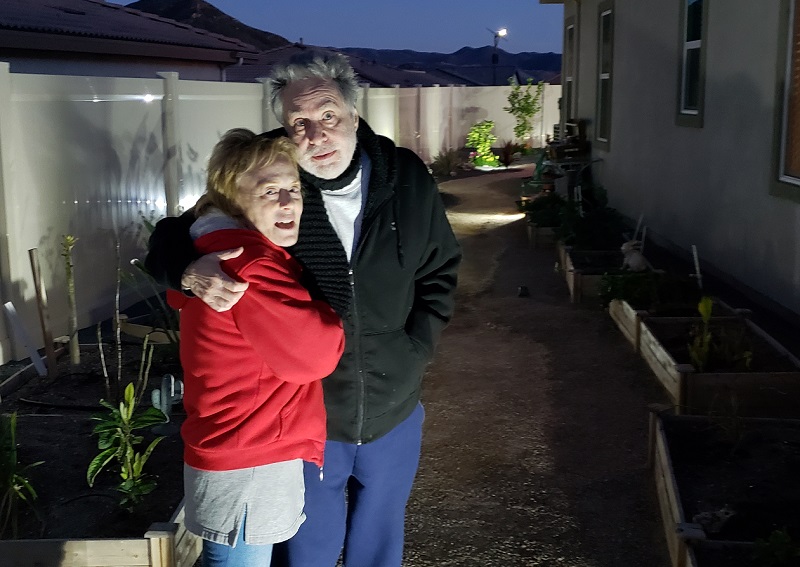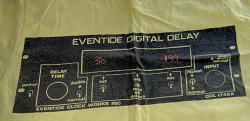RIKLBLOG
|
| Tomorrow |
| 19 July 2023 |
| Yesterday |
| Index |
| Eventide |
| SETI League |
| PriUPS Project |
| Bonus! |
| Contact |


This Particular Steve Katz Was, Briefly, a Ham
In my young life, pretty much everyone I knew was into ham radio, with a federal license and a set of call letters. One of my earliest and still one of my best friends was a fellow named Kenny Schaffer. He currently sports the "call sign" N2KS and can be heard on the radio episodically. I 'met' him when we were both pre-teens, and the scare quotes are due to the meta-meaning of met, referring in this case to communicating with Morse Code. we communicated enough to realize that we could be candidate-friends and lived a subway ride from each other, and eventually met without the scare quotes. Although we went to different high schools and, eventually, colleges, we stayed friends. He, a natural promoter if there ever was one, got involved in the rock and roll business. I, a radio geek if there ever was one, started a brief career at NYC radio station WABC. Of course I listened to WABC while I was at work, and mostly while at home as well. A major summer hit of 1966 was Walk Away Renée by the Left Banke. A song of destiny!
Steve Katz met Kenny at a party, and they became friends. Steve and Kenny had a challenge: The two of them had gotten involved with the Left Banke through the father of Mike Brown. Mike was the song's author and the band's keyboardist. Then on the crest of success with their hit song, the band was determined to build their own recording studio. Kenny and Steve were engaged to build it, and I was recruited to help with the electronics hardware. I recall I built a potted amplifier for their console and did a bit of wiring and console design as well. I even got to meet the band! In addition to this side project, Steve became gainfully employed at a New York City recording studio on 54th Street called "Juggy Sound." It didn't stay Juggy Sound for long; ownership devolved on Orville Greene, a much older gentleman and a patent attorney for reasons that would make an interesting blogitem. But this blog is about Steve, who was in his early 20s as was I.
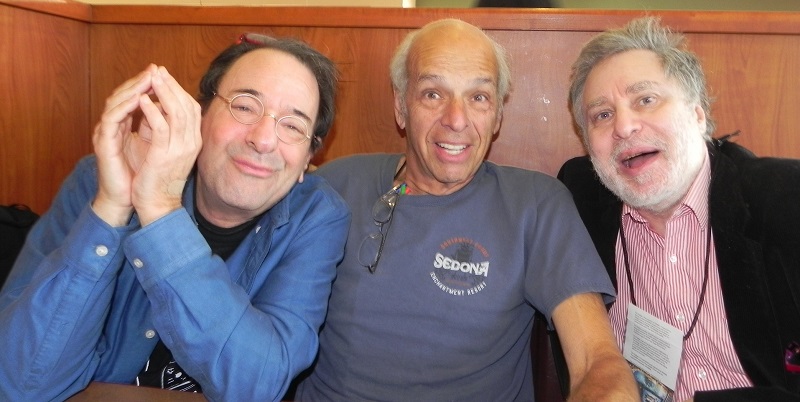 |
| No longer in our early 20s, Kenny (left) and Steve (right) managed to get together in 2014 for the first time in almost a half-century. |
The studio, renamed Sound Exchange, was very small. In particular, the control room in which Steve committed his recordings had barely enough room for him, his legs, and the increasing complement of recording gear, the largest item of which was an Ampex MM1000 16-track analog tape recorder. State of the art in the '60s! Normally studios had an assistant engineer, also called a tape-op, to do mundane tasks such as running the large tape reels back and forth to cue the tape. But... no room! Steve asked me if I could build a labor-saving device that would rewind the tape to a designated location. If this is beginning to sound familiar, you've probably read a somewhat less Steve-centric version about the Founding of Eventide. In that first year, Steve and I had completely different roles. He was wise in the ways of the NYC recording scene; I was the guy with the light table and tape for designing printed circuit boards. And Orville was the guy with the money. (Kenny wasn't involved with our nascent company—he was in Ibiza at the time—but later used his promotional skills with our (print!) advertising. Logo, slogan, fonts, design, some of which we continue to use half a century later. Thank you, Kenny!)
Steve Had a Boat, I Had a Motorcycle
At least at the beginning of the day. You'll find out what happened to which conveyance shortly. When a couple of entrepreneurs start a company, especially when they have complementary talents, and even more especially when they are in somewhat uncharted territory, they tend to spend a lot of time gabbing, planning, discussing, and, occasionally, arguing. This required spending a lot of time together. I had no life, and was indifferent to the time I spent "working," both in quantity and with respect to day part. My only concession to the compulsion to move forward with corporate activities was the need to sleep, which kept me vaguely in sync with the diurnal cycle. Steve was married, and had obligations attendant thereupon. The boat, which slept two and had no distracting sails requiring physical labor and nautical jargon, facilitated both wife-time and Richard-time. (We all loved being on the water, including Karen, my first, current, and only wife, whom I would never have met were it not for the Steve connection. Thank you, Steve!)
And so, on several occasions, I would meet Steve at the dock, clamber on board, and have a splendid day-adventure, during which some business got discussed and aquatic activities undertaken. One very special day in my memory comes with this story: Instead of taking a subway, I decided to brave the NYC roads and parkways by riding my somewhat unreliable motorcycle to the dock. It chose that trip to demonstrate its ultimate unreliability. I pulled off the road and after a minute's hesitation I also pulled off the license plate, thus donating the motorcycle to anyone who needed some spare Yamaha parts. I walked back to the road, thumb out. (It's called "hitchhiking," something young people did in those days. Many survived notwithstanding parental horror.) Perhaps you've guessed by now that I was picked up on the side of the road by Steve and Irene in their tiny car, after which we proceeded to the boat and had an absolutely splendid day**.
Sadly, as the joke goes, the happiest days in a sailor's life are when he gets a boat and when he sells it. I don't remember the exact circumstances of when and why Steve sold the boat, but in any event he couldn't have sailed it to Nashville. And I'm getting ahead of myself.
The Burning Toilet Episode
The days were a blur. As were the years, albeit they were precious few. Steve was a recording engineer and deeply involved in the New York City studio scene. Do you remember McKendree Spring? Steve was the recording engineer on several of their wonderful albums in the late '60s through '71. I think he managed to record a Jimi Hendrix session, too. (I wish I remembered some of his other credits; I listen to McKendree Spring to this day.) During these years, Eventide, our company, progressed from making a handful of special-purpose products for specific customers to creating branded products for the recording industry. Steve, being the first to have and use them, and with his wealth of practical experience guiding the design and features, managed to be part of the creation of products still considered legendary. You can today purchase software emulations of our original Instant Phaser® and Eventide delay lines, rudimentary then, were the standard of the industry for a decade. As precious as Steve's contributions were to the design of the products, his efforts to commercialize them were possibly more valuable. He knew everyone, including a handful of studio denizens with budgets. Yes, we were successful in extracting actual cash money for the phasers and delays from the studios, who in turn used them on recording sessions for some of the most famous acts in rock and roll history. (There are a few more "Thank you, Steve"s in this paragraph.)
Two of the highlights of our existence while Steve was still involved were Audio Engineering Society conventions. The first of the two was where Eventide exhibited several notional products—basically front panels with blinking lights—which were used to elucidate what our candidate customers might be willing to purchase. The second AES, and the beginning of the end, was in Los Angeles, at which Steve met someone***.
Steve and Eventide were doing well even though it was too soon to start taking a salary for either of us. Then the burning toilet fell through the roof. Eventide was in a small building at its original address on 54th Street in Manhattan, New York City. Next door was a small abandoned apartment building which at the time was inhabited by villains, thieves, scoundrels, and addicts. How one of the latter (we were told) managed to set a toilet afire and throw it off that roof onto our somewhat lower one will remain a puzzle. The fire spread throughout the recording studio which was Steve's domain and pretty much destroyed his place of striving and his source of income. Eventide's nascent factory in the basement was spared the fire, but there was substantial water damage. Although both the studio and the factory eventually recovered, it took a long time and Steve had had enough. He and the someone moved to Nashville.
Which ends my personal, full-time acquaintance with Steve. While there was no internet in those days, we did have telephones and airplanes, so we weren't strangers.
Nashville Katz*
When Steve went to Nashville, he got a job with Dave Harrison. An interesting sentence in that history link mentions the Pandora delay line. Steve! Their consoles remain available and well regarded to this day. He eventually broke up with someone, and somewhat later decided his fortunes were in Hollywood. He went to work for one of the companies making noise reduction hardware, which was on the way to becoming a household name: Dolby Labs.
Hollywood
Can you say "illustrious career?" If that's difficult, practice with these names: The first Star Wars. Close Encounters of the Third Kind. Steve was the Dolby consultant on both of those films, of which you may have heard. Oh yes: A Star is Born! Altered States! Wow!
Steve worked on Star Wars and alerted me as to how incredible it would be. Although I'm not a big film buff, on his word I went to the film on opening night in New York, before it became a thing. At the end I waited to read the credits: Stephen M. Katz, Dolby Consultant! Sadly, it never occurred to me that this one film would greatly and positively affect the stock price of 20th Century Fox, the studio that made it. Five members of the Dolby crew, Steve included, received an Academy Award in 1979 for their film program.
Steve the Movie Mogul
I'm sure the Hollywood years were a blur for Steve just as those years in New York and then New Jersey were for me. We stayed in touch, but not in detail. We bought a house! Real estate at that time was "exploding" (in a good way) and we were partners in a house in Van Nuys. I would stay there on occasion, typically when there was an AES convention in LA. Steve had a pool! And a pool boy! (Yes, a visiting, once-a-week pool boy, but I was from New York City and it was a truly novel concept.) We sold the house some years later at only a modest profit, and he bought a place in Encino.
Steve and I were partners in the house and also in one less orthodox business venture. Unaccountably Steve wanted to become a movie mogul and wanted me to invest. Knowing nothing about the movie business and having faith in Steve's acumen, I agreed to do so, to the tune of $25,000. This was in the '80s, when $25k was worth almost $25k. Normally, in my no-suspense blogging, you would read about who and how and what this was all about and how it turned out****. But Steve's funeral is coming up, and I have to reserve a story to tell. Maybe I'll replace this sentence after I tell the story. And maybe I won't. I'll decide later.
Steve and Aundrea
After a couple of marriages and some interim exes, this one stuck!
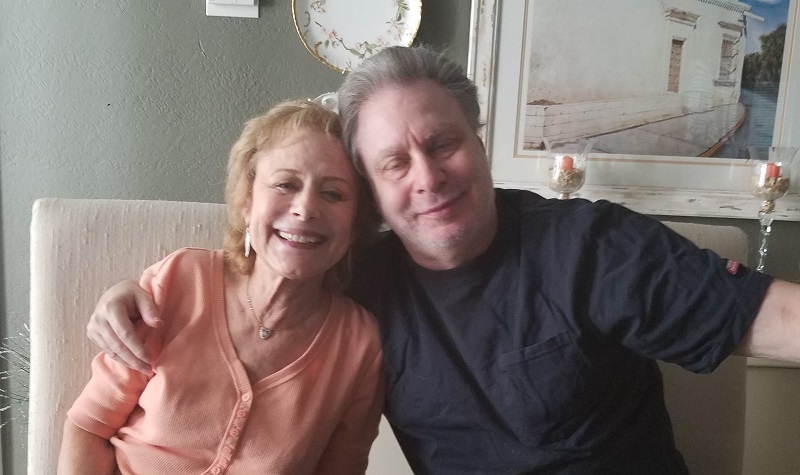 |
| Aundrea and Steve in Encino (above) and in Beaumont (2019) Who knew it gets chilly in California? |
Not that I'm an expert, but I had never seen a happier couple. I remember attending their wedding after an all-night drive that ended up with my crashing on their couch for a couple of hours before the nuptials.
Aundrea died from cancer less than two years ago, after 35 years of marriage, during the Covid plague. Steve changed and became less communicative, both for the obvious medical reason and because of the loss of his wife. Despite our 55-year friendship, the last time I visited hardly a personal word passed between us. But there was still his Project. This past April I drove up to his house in Beaumont and within minutes was listening to some very recognizable recordings—Dark Side of the Moon, anyone?—on Steve's elaborate surround-sound system.
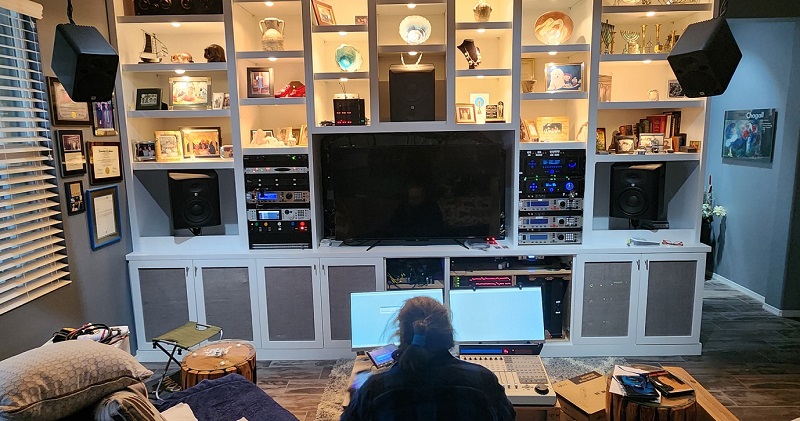 |
| Steve, Surrounded |
It sounded amazing. The system was an idiosyncratic collection of gear and Steve's unique knowledge of how it was all put together. I'm sure he had commercial ambition for it, but without his tutelage it is destined for deconstruction. I might add that Aundrea encouraged this activity to the extent of ceding her living room to Steve's audio ambition. Now that's love!
Aundrea and Steve's son Jonathan was kind enough to provide an update on Steve's later life in sound. Wait until you see the construction Aundrea encouraged.
Our Last Visit
I took this picture on our last visit, just a few months ago. I did not expect it to be the last, although it was an odd visit indeed. Beaumont is a long drive from Sedona, so casual visits aren't practical and I would typically stop by on the way to the NAMM show in Anaheim. Due to the pandemic, there had been no NAMM and no Steve visit for several years. My previous visit had been in 2019 and almost all seemed well. Steve's voice had gone a bit gravelly, which I noticed and mentioned. I guess it had happened slowly enough to be disregarded, but it turned out to be cancer and the repair involved loss of his voice. I was unaware of any sequelae and Steve seemed to be coping well enough. His loss of Aundrea two years ago was, I'm sure, harder. Even so, Steve had not only the audio project, but was writing a screenplay! I had a look at an early draft; let's just say I'm not the best critic of such material. The point is, he had a lot going on. And yet...Steve said he never went out and never had visitors. I didn't know what to make of that, and was on my way shortly afterwards.
When Steve's son Jonathan emailed me about his demise, it came as a shock. I may have been in touch with Steve longer than anyone else he knew. His parents are gone, and his sister's whereabouts are unknown; presumably they were estranged. I almost feel like an heir. Although he left Eventide after only a couple of years, it wouldn't exist without him. Neither would I have met my wife and my life would have been quite different. He has been a background presence for all these decades, and despite the word "background," losing a long-term friend unexpectedly is unsettling. even at our age.
| Update 12 August 2023 |
The funeral was held in Beaumont California, where Steve lived in his final years. Several colleagues from the audio industry, including Ioan Allen from Dolby, Larry Blake, and I, told Steve stories and universally applauded his prowess and legacy in film sound and audio recording.
* Yes, I'm aware that there were two hit songs, Nashville Cats and Noshville Katz. Thank Bastet there was no Noshville Cats.
** Since this is mostly a Steve story, I won't relate here how I was rewarded later that day with Franny and Zoe, as Steve called them. Steve had a thing with monikers. I'll spare you the name he made up for me. In jest, I think.
*** This means exactly what you think it means. I remember names, places, and had some personal embarrassment. I don't feel the need to detail it further.
**** Hint: Much later in life I learned you should not invest in anything about which you espouse total ignorance. For example, the international shrimp trade.
| © 2023 |
| Richard Factor |
NP: "Walk Away Renee" The Left Banke |
( |
ToTD This is the first Eventide T-shirt. The product depicted is the Eventide 1745A digital delay, which we were just starting to work on while Steve Katz was still with the company. The delay line was first shipped in 1973. |
|
